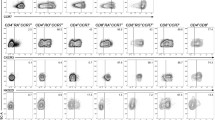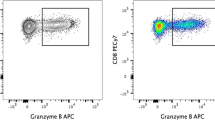Abstract
During the last two decades, the immunology field has been focused on the study of conventional T-cells, leading to important advances in identification of specific subsets involved in promoting and suppressing immune response in patients with cancer, autoimmune disease or transplanted patients. In these recent years, the research on unconventional subset of CD4−CD8− double-negative T-cells is growing. DNTs are a unique subset of T-cells characterized by being CD4−CD8−CD3+ and express either ß or α T-cell receptors (TCR). In this chapter, we describe the methods used to phenotypically characterize and isolate these cells in order to study their functional profile.
Access this chapter
Tax calculation will be finalised at checkout
Purchases are for personal use only
Similar content being viewed by others
References
Lanzavecchia A, Sallusto F (2001) Regulation of T cell immunity by dendritic cells. Cell 106(3):263–266. https://doi.org/10.1016/s0092-8674(01)00455-x
Anikeeva N, Sykulev Y (2011) Mechanisms controlling granule-mediated cytolytic activity of cytotoxic T lymphocytes. Immunol Res 51:183–194. https://doi.org/10.1007/s12026-011-8252-8
Murphy KM, Ouyang W, Farrar JD et al (2000) Signaling and transcription in T helper development. Annu Rev Immunol 18:451–494. https://doi.org/10.1146/annurev.immunol
Walker JA, McKenzie ANJ (2018) TH2 cell development and function. Nat Rev Immunol 18(2):121–133. https://doi.org/10.1038/nri.2017.118
Klebanoff CA, Gattinoni L, Torabi-Parizi P et al (2005) Central memory self/tumor-reactive CD8+ T cells confer superior antitumor immunity compared with effector memory T cells. Proc Natl Acad Sci USA 5:9571–9576. https://doi.org/10.1073/pnas.0503726102
Cavalcanti E, Gigante M, Mancini V et al (2010) JAK3/STAT5/6 pathway alterations are associated with immune deviation in CD8 T cells in renal cell carcinoma patients. J Biomed Biotechnol 2010:935764. https://doi.org/10.1155/2010/935764
Brandt D, Hedrich CM (2018) TCRαβ(+)CD3(+)CD4(−)CD8(−) (double negative) T cells in autoimmunity. Autoimmun Rev 17(4):422–430. https://doi.org/10.1016/j.autrev.2018.02.001
Juvet SC, Zhang L (2012) Double negative regulatory T cells in transplantation and autoimmunity: recent progress and future directions. J Mol Cell Biol 4(1):48–58. https://doi.org/10.1093/jmcb/mjr043
Lu Y, Hu P, Zhou H et al (2019) Double-negative T Cells Inhibit Proliferation and Invasion of Human Pancreatic Cancer Cells in Co-culture. Anticancer Res 39(11):5911–5918. https://doi.org/10.21873/anticanres.13795
Yao J, Ly D, Dervovic D et al (2019) Human double negative T cells target lung cancer via ligand-dependent mechanisms that can be enhanced by IL-15. J Immunother Cancer 7(1):17. https://doi.org/10.1186/s40425-019-0507-2
Lee J, Minden MD, Chen WC et al (2017) Allogeneic human double negative T Cells as a novel immunotherapy for acute myeloid leukemia and its underlying mechanisms. Clin Cancer Res 24(2):370–382. https://doi.org/10.1158/1078-0432.CCR-17-2228
Merims S, Li X, Joe B et al (2011) Anti-leukemia effect of ex vivo expanded DNT cells from AML patients: a potential novel autologous T-cell adoptive immunotherapy. Leukemia 25(9):1415–1422. https://doi.org/10.1038/leu.2011.99
Popescu I, Pipeling M, Akulian J, McDyer J (2014) Phenotypic and functional characterization of cytotoxic T lymphocytes by flow cytometry. Methods Mol Biol 1186:21–47. https://doi.org/10.1007/978-1-4939-1158-5_3
Acknowledgments
The authors thank Dr. Nada Chaoul for her help in performing and setting experiments and building the figures.
Author information
Authors and Affiliations
Editor information
Editors and Affiliations
Rights and permissions
Copyright information
© 2021 Springer Science+Business Media, LLC, part of Springer Nature
About this protocol
Cite this protocol
Gigante, M., Ranieri, E. (2021). Phenotypical and Functional Characterization of Cytotoxic Unconventional T-Cells. In: Gigante, M., Ranieri, E. (eds) Cytotoxic T-Cells. Methods in Molecular Biology, vol 2325. Humana, New York, NY. https://doi.org/10.1007/978-1-0716-1507-2_2
Download citation
DOI: https://doi.org/10.1007/978-1-0716-1507-2_2
Published:
Publisher Name: Humana, New York, NY
Print ISBN: 978-1-0716-1506-5
Online ISBN: 978-1-0716-1507-2
eBook Packages: Springer Protocols




